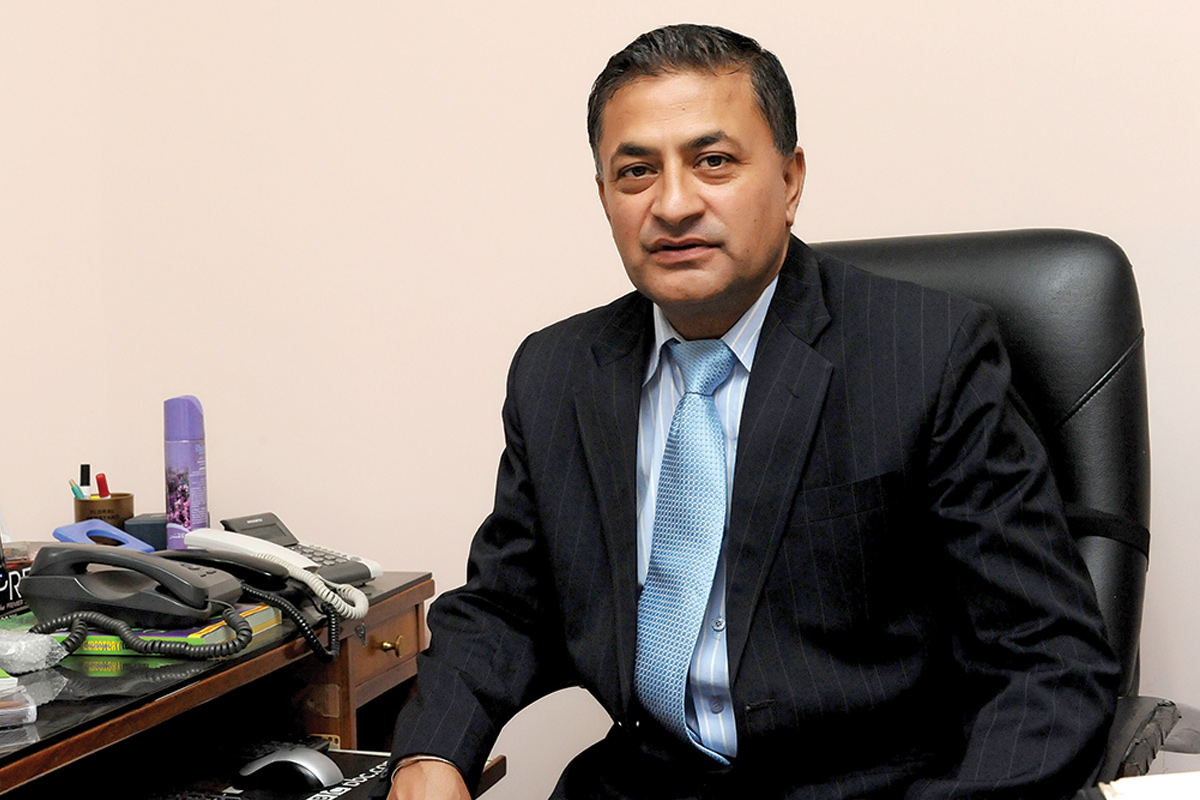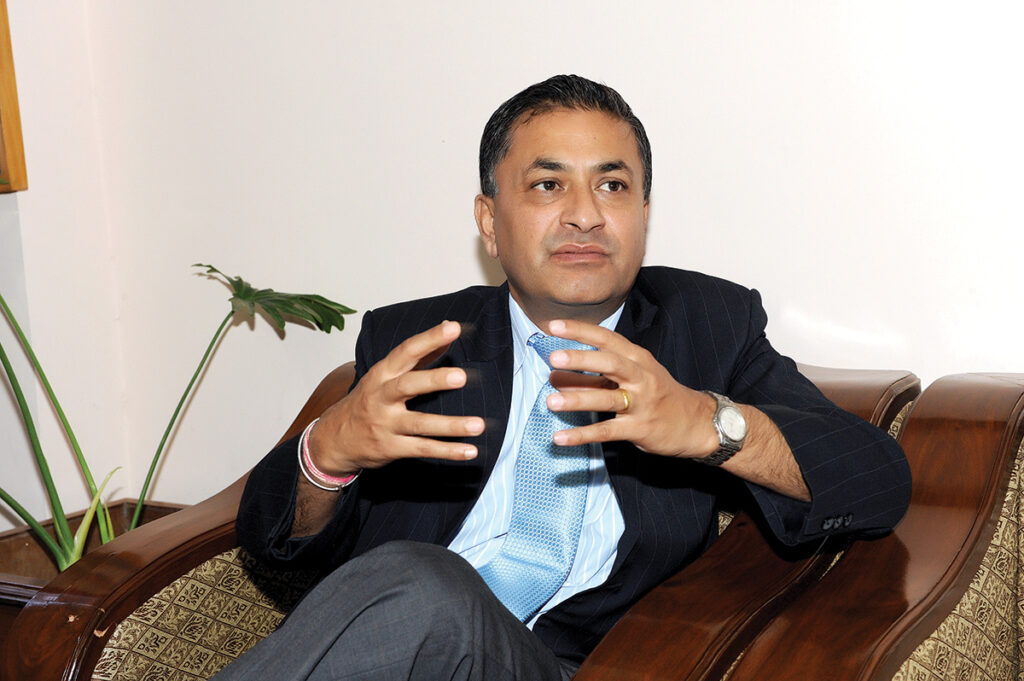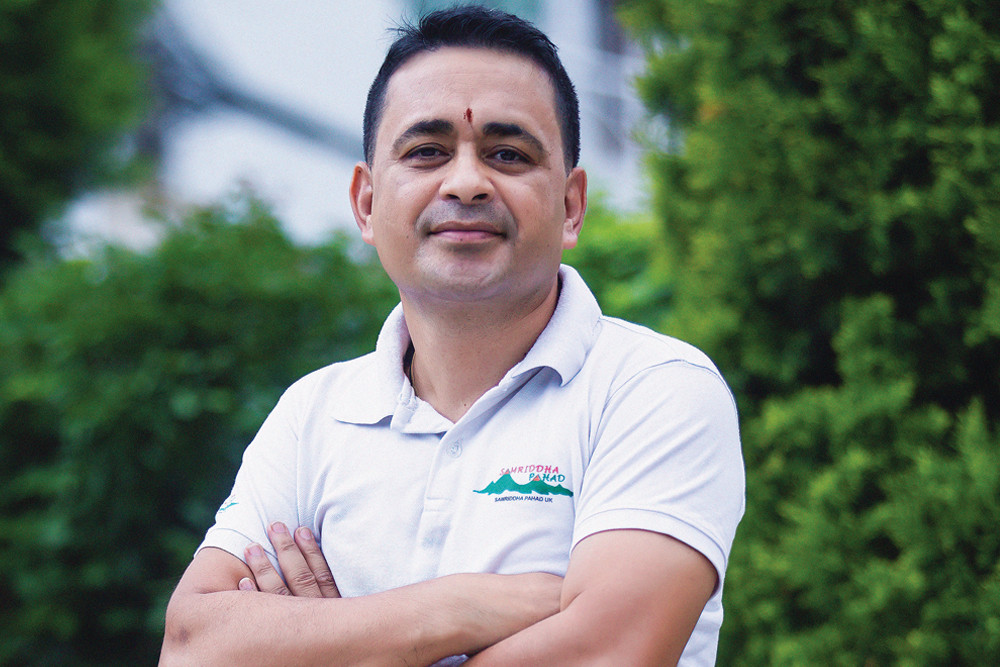
Aditya Baral is the Co Founder of XcelTrip OTA and Country Director of the online travel aggregator’s Nepal chapter. He did his MBA from University of Allahabad, India in 1989 and joined the Economic Services Centre, a semi-government entity involved in Industrial and Management Feasibility and other types of allied researches, as Research Officer (Section Officer) where he worked for five years and thereafter joined the Foreign Aid section of the Embassy of Japan as Economic Expert.
Baral then took a hiatus from work and went the USA for further studies but had to return mid way due to pressing reasons. On return, Baral worked as lecturer for MBA students at the Kathmandu University and Tribhuvan University. He also assumed the role of Advisor with the National planning Commission with a clear mandate to enhance administrative efficiency of bureaucracy funded by the World Bank.
In 2000, Baral joined Nepal Tourism Board looking after marketing, promotion and public relations as the head, a career that spanned over two decades. While at NTB as Senior Director, late Prime Minister G.P. Koirala awarded Baral with the opportunity to look after Foreign Affairs as Advisor to him and they collectively accomplished the first historic election of the Constituent Assembly in 2008.
“When K.P Oli’s government came to power with an overwhelming majority, NTB had already experienced a weak administration and indulgence of government was immense in its composition, hence nepotism, favouritism and other applied negative “isms” started pervading manifold in its daily practices. Professionalism gradually started waning. Just staying there to pass time as a “jagire” could not pacify my soul hence I decided to quit and thought of joining Xceltrip where I have partly invested a substantial amount of my energy as an advisor in the past,” states Baral. He feels strongly that a platform like Xceltrip is the need of the hour and future travel shooter aiming to disrupt the disruptors.
Baral is looking to create a milestone with his new initiative. Before the lockdown, XcelTrip had already created several high points in the local, national and regional markets of South Asia. “We are confident that immediately after the lockdown we will change the travel pattern in Nepal and abroad working under our original tagline ‘disrupting the disruptors’. Baral is energised working with a young and vibrant tech. “The sky is the limit in digital paradigms. And this is the perfect platform for risk-takers,” he says.
Excerpts of an interview with Dibesh Dangol of B360 on what leadership means to Aditya Baral:

How would you define leadership?
I have always felt lucky to experience myriads of micro and macro challenges. While working with the PM of Nepal in turbulent situations (2008/09), I had a great opportunity to look at Nepal from a microscopic prism. Thus leadership to me means ‘action’ and not ‘positions’. Leadership does not provide leverages to delay, wait, prolong, irrespective of mistakes. Humans make mistakes, only fools repeat them. Pondering, soliciting, seeking, hobnobbing, assembling is the essence of quality leaders. Loquacious, hollowness, excessive sense of humour on all fronts, projecting pseudo nationalism are the qualities embedded to hoodwink their supporters or followers which we are encountering today. In essence, leadership is “delivery”. No matter how hard you work, the followers expect smart work with the early delivery of results. Cooperation, assimilation, humility and wisdom are the ornaments of modern leadership. Even education is non-mandatory in leadership as we have witnessed so many uneducated leaders who have delivered beyond expectations. A true leader is one who solicits ideas from others but takes bold and pragmatic decisions himself. The leader who understands his people parallel, above and below him and endeavours to deliver without changing the goal post honestly is the true leader.What are the most important values a leader should demonstrate?
Honesty and integrity are the greatest values a leader should possess. If a leader is selfless, he can be decisive in front of anyone or any circumstances. We should not try to become a person of success but a person of value. If the attachment is the cause of bondage, its principal source is ego. Therefore, to be completely free of bondage, one has to get rid of the feelings of “I, me and mine”, which is difficult to follow in reality. It has become the killer of leadership integrity in a country like ours where greed to accumulate wealth has become the norm of society. Also, I guess if a leader imbibes the vision of equality then he leads to peace and freedom. Selfless action purifies the actor and detaches him from the fruits of action and finally frees him from this bondage.
What are your greatest strengths and weaknesses as a leader?
This question should have been thrown to my colleagues or peers at the workplace more than to me. However, upon introspection, I guess I am a restless person comprehending the bottom-line objectives discharging duties with an early expectation of results. Being human, I am told by my friends that I am a soft leader based on the group dynamics. I entrust my team and try as much as possible to devolve powers and authorities. I am a person who is not interested in procedural formalities. However, I expect to reach the goal within stipulated timeframe. My greatest plus point is that I lead my team fully assimilating with them, providing them proper direction, and nip the bottlenecks from the bud. My greatest weakness is that I am impatient and a little nervous in last-minute delivery. Also, I tend to be harsh with non-performers and do not endorse diatribe with subordinates. My engagement, experience, education (I read for 3-4 hours a day) and massive PR also sometimes inject arrogance in my dealings if meeting matchmakers are not up to the level playing field.How is a leader different from a manager?
A manager works under a defined square box under many leaders however a leader only proves his mettle and outcome through independent actions. The core difference between leaders and managers is that leader has people to follow him while managers have people who work for them. In other words, a leader chalks out a vision or goal post and strives to reach there by employing the efforts of many people including managers, but many managers strive to bring into reality that objective chalked out by his leader. Simply put a leader has a macro job and a manager has a micro job.How do you encourage the development of your employees?
Poor countries and opulent countries have different notions in terms of motivating their subordinates. Proper emoluments, good work culture, ambience, avenues to grow further, up-gradation of their skills through proper training and administrative freedoms in terms of their excellence are the major ingredients of development. In a poor country like ours, perks and benefits have become the yardstick of permanency in the job they hold. I still see many of the big corporate houses have not imbibed true corporate culture and hence nepotism, favouritism and other “isms” are massively in practice. The employer evaluates an employee more in terms on “Who you are” than “What you are”. This spirit retards the honest growth of employee professionalism in Nepal. The master-servant relationship is massively in vogue in big corporate houses in Nepal.Whose leadership skills inspire you?
On the political front, Bill Clinton is my ideal leader. The way he handled the turbulent phase of his presidency with widespread accusations on his personal life, taking his wife into confidence and lambasting the opponents side by side makes me think of him as a hero. I salute Google’s CEO Sunder Pichai, Microsoft’s CEO Satya Mandala and Facebook’s CEO Mark Zuckerberg and other entrepreneurs who have brought the digital revolution to unite the whole world through a smartphone by not investing money but investing their smart work (knowing their customers from inside out) and diligence. The present world today knows that to be a billionaire of the modern times, one does not need money but diligent innovation in any field.What are the keys to developing the next generation of leaders?
In my perspective, some are born to be leaders while some are groomed to become leaders. Some have inborn talents and others gradually gain through experiences and engagements. But the best way to develop future leaders is through sanitising the workplace and devolving immense responsibility but with commensurate accountability. A minor mismatch can derail this process. A proper tradeoff in decision power, environment and setting of goals is required to make a leader successful.What would you consider your most significant accomplishment?
Hard work, practice and sense of proving oneself always dissimilar to peers and colleagues in terms of garnering knowledge, experience, modest behaviour. I never let my habits dominate my daily routine. Going through various books and articles and magazines are my mandatory routines either in the mornings or sometimes in the evening. I have always imbibed the notion that “Getting older is mandatory, but growing up is optional”. Hence, time never constrained me from deviating from my chores which kept me abreast, healthy and always in a ready-to-move spree.How do you assess the current tourism status of Nepal? How can the leaders in the tourism sector work individually and cohesively to revive the tourism industry post lockdown and international travel ban?
Tourism is the most fragile and hardest hit sector compared to others. It is at the lowest ebb ever in history. The status of tourism in Nepal will remain fluid for the coming year too. As Nepal entirely depends on India, China, US, UK and other few European countries primarily for receiving the consistent flow of tourists, these are considered our primary markets in the lexicon of tourism history and trends. We all know that the whole world has been aggrieved by the pandemic and entire world’s economy is in a tailspin. Deeming these factors, to roll the wheels of tourism initially, Nepal has to inspire Nepalis to kickstart their movements within Nepal. Like it or not, this would be the first process to inaugurate the wheel jam of tourism economy within our country. The government has to inspire with robust policies fine-tuning compliances with the aviation, ground transporters and other required private sectors. Once we show to the world that Nepal’s tourism is ready to receive foreigners with immense safety protocols on hand, point to point regional travel/markets can be allured. For this to happen, we have to promote all the online airlines coming to Nepal. Then, conventional markets, including long haul, can be approached with due incentives. Forget about promoting through conventional means like participating in trade fairs, marts or road shows for at least a year, digital blitzkrieg should be the ultimate answer as a clarion call. I guess OTA platforms like Xceltrip, the only international level Online Travel Aggregator in Nepal and others can help mitigate the agony and approach true imminent future travellers at bare minimum cost digitally. All the factors postulated above are not a cakewalk. The Minister of Tourism has to be robust and proactive because his voice works to endorse the destination image/choices amongst potential foreign travellers. Proper coordination amongst the government, airlines, hoteliers, embassies, and travel agents is the need of the hour and Tourism Minister should stand as a leader to mobilise and chalk out lucrative offers with his massive market outreach. Otherwise, we will miss the bus and we will not be able to harness even the historical fruits that are privileged with. Because the economics of the trade would change, as supply chains have broken, there is the emergence of newer players in the value chain. Negotiation is becoming tougher, group travel is retarding, long haul travel is less preferred by the future travellers, hence new business in new normal will start from zero. The dynamics of trade would see newer paradigms which may appear after stabilisation if not immediately for sure. The orientation of our government’s perspective has to transform. The Ministry and NTB should set up a separate functioning department of digital technology within their structures getting rid of the chronicles and conventional manoeuvres.
Published Date: September 14, 2020, 12:00 am
Post Comment
E-Magazine
RELATED Leadership


.jpg)


.jpg)